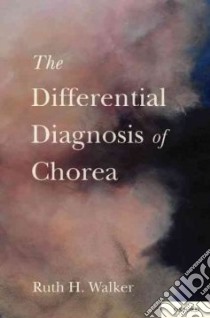The Differential Diagnosis of Chorea - 9780195393514
Un libro in lingua di Walker Ruth H. edito da Oxford University Press, 2010
- € 81.64
- Il prezzo è variabile in funzione del cambio della valuta d’origine
The Differential Diagnosis of Chorea provides a comprehensive account of the various neurological conditions, both genetic and acquired, that lead to this involuntary movement disorder.
While Huntington's disease is the prototypic, and best known, form of inherited chorea. it has become apparent that a small but significant proportion of patients with this phenotype have a disorder other than HD. It is vital to correctly diagnose all patients with chorea. With advances in molecular medicine. it is now easier to identify new genetic causes of chorea and expand the phenotype of disorders not typically thought to cause this movement disorder.
In addition to the genetic causes of the choreas, non-genetic etiologies are also discussed, including medications, structural lesions, psychogenic causes, autoimmune, and metabolic abnormalities. The book also addresses pathophysiology, psychopathology, and management of chorea, thus providing the most comprehensive source of information on chorea.
"The Differential Diagnosis of Chorea is an important milestone in neurology and movement disorders. The text represents a new degree of sophistication for neurologists and movement disorders specialists when an entire book related to the differential diagnosis of chorea is published. ... This book will be of value to neurologists, psychiatrists and residents in neurology and psychiatry as both a practical guide to the treatment of chorea and a review of the diseases and syndromes in which chorea occurs."---William J. Weiner, MD Professor and Chairman, University of Maryland School of Medicine, Department of Neurology, Director, Maryland Parkinson's Disease and Movement Disorders Center. Baltimore, MD
"This [is] an excellent book that is currently the most comprehensive single work on chorea and which of great value to all who work in the field of movement disorders."---Roger A. Barker, MD Department of Neurology and Cambridge Centre for Brain Repair, Cambridge, UK
Informazioni bibliografiche
- Titolo del Libro in lingua: The Differential Diagnosis of Chorea
- Lingua: English
- Autore: Walker Ruth H.
- Editore: Oxford University Press
- Collana: Oxford Univ Pr (Hardcover)
- Data di Pubblicazione: 30 Settembre '10
- Genere: MEDICAL
- Argomenti : Chorea Diagnosis Diagnosis, Differential Chorea diagnosis
- Pagine: 452
- ISBN-10: 0195393511
- EAN-13: 9780195393514


